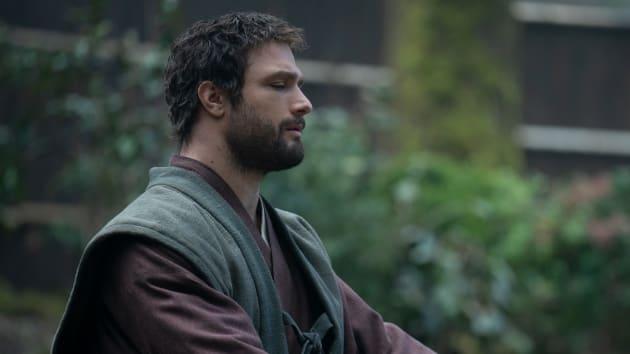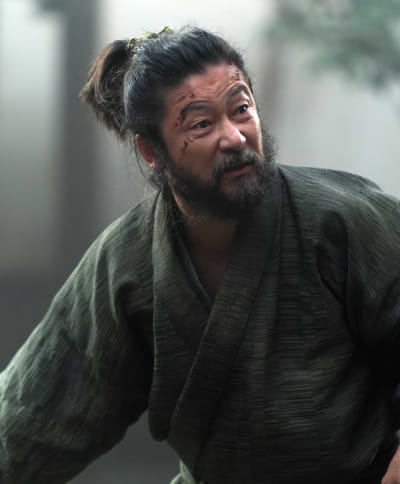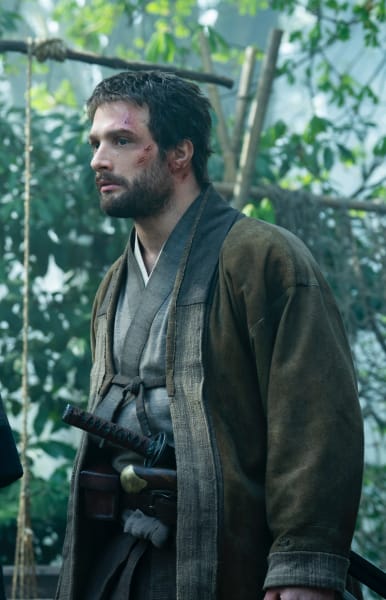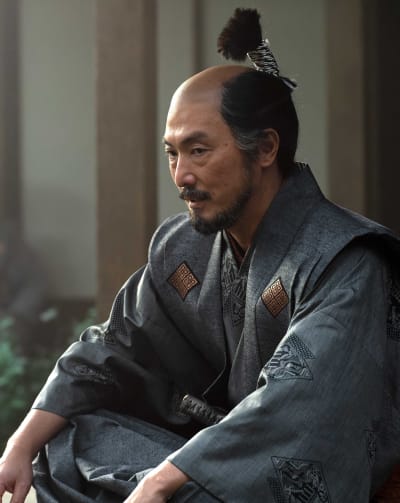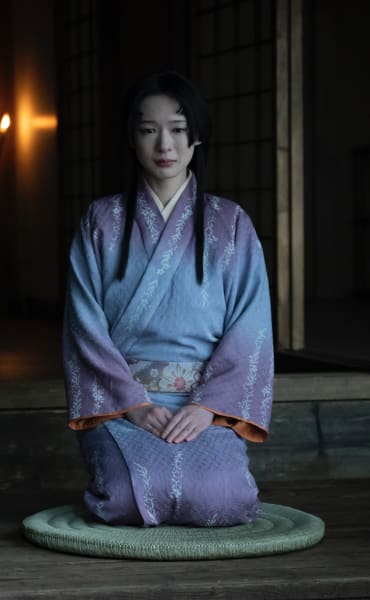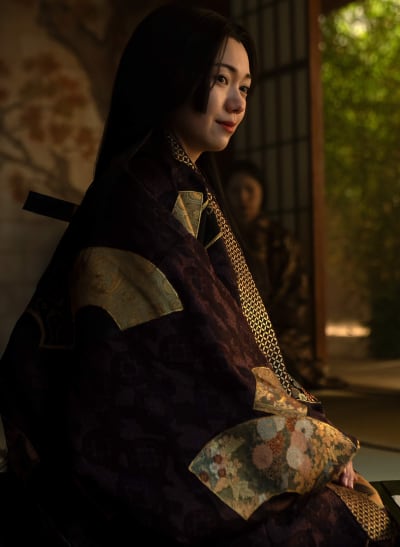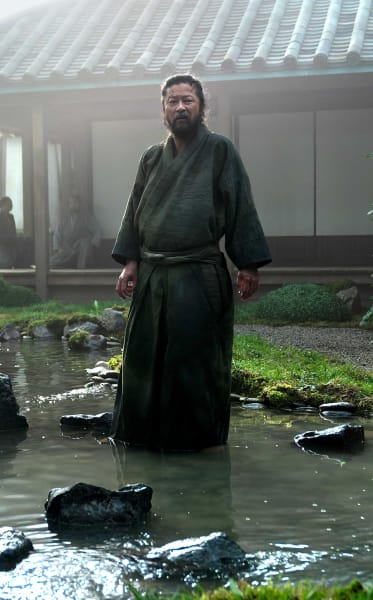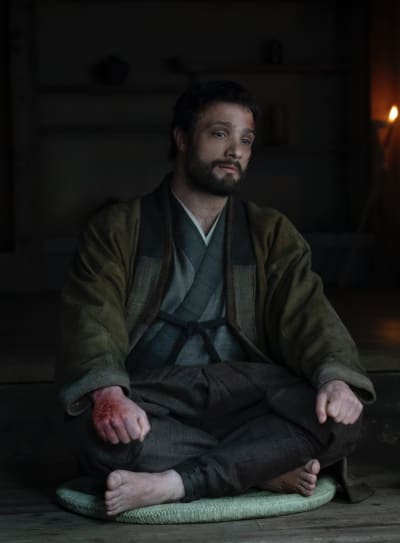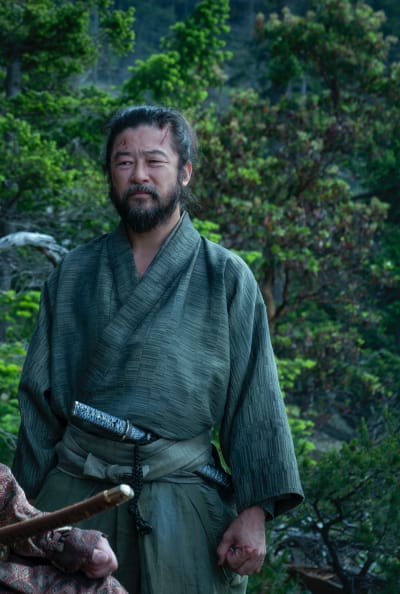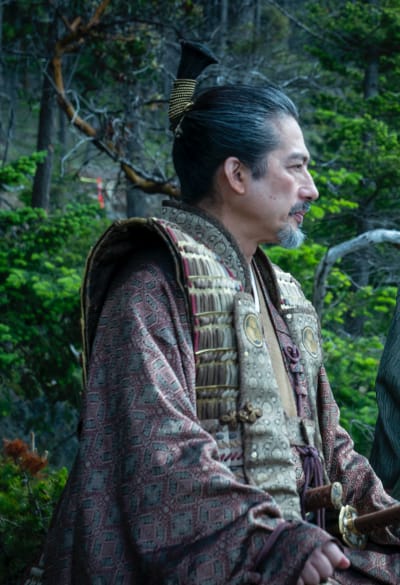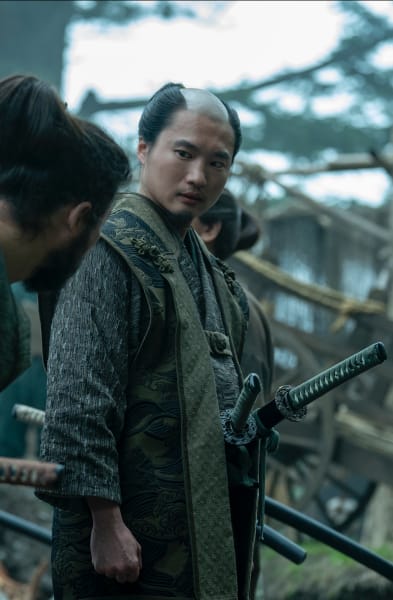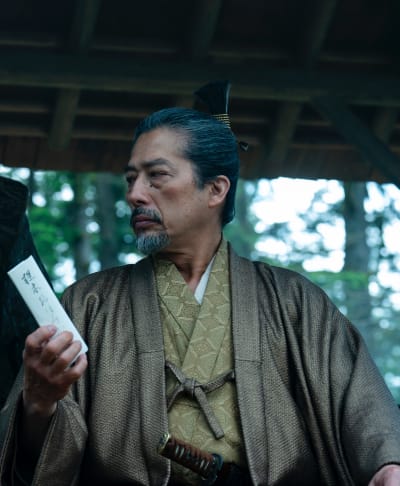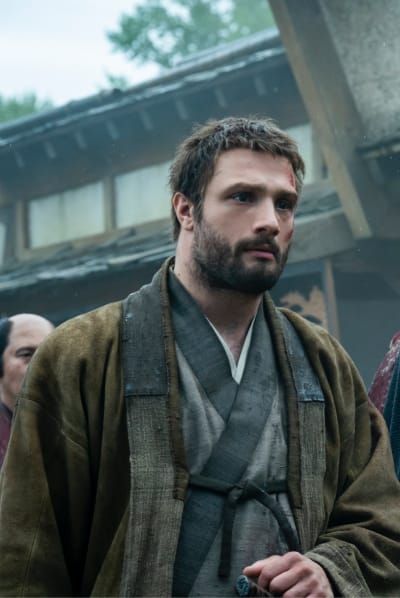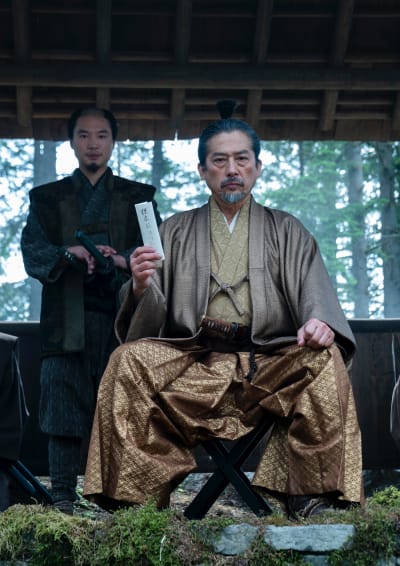Given the shocking conclusion to Shogun Season 1 Episode 9, we suppose it should come as no surprise that the title of the series finale would refer to the ephemerality of human life.
On his deathbed, the Taiko — whose demise set in motion many of the events we’ve witnessed thus far — referred to life as a dream within a dream.
And no one was more aware of the fleeting nature of our time on earth than the Taiko’s fellow improv poet, Lady Mariko.
Yes, in the previous installment, Mariko went out in a blaze of self-sacrifice, arms spread at her sides in a likely reference to her Christian faith.
It’s an image that we return to in the surprising opening scene of Shogun Season 1 Episode 10.
An elderly Blackthorne, back in his native England, lies on his own deathbed and clutches a cross as his grandsons inquire about his tales of heroism.
It’s a bold narrative choice in an age in which dramas tend to prioritize suspense at the expense of just about every other facet of storytelling.
We now know that the Anjin survives the clash between Toranaga and Ishido and that he further defies the odds by making his way back to his homeland.
The question now is — how?
Before the peaceful ending, of course, comes the heartbreak:
Blackthorne has been a comedic figure throughout much of Shogun, a fact that makes his obvious heartbreak over Mariko’s death all the more affecting.
Mariko’s motives were complex, of course:
For years, she’d harbored a desire to take her own life, but in Osaka, she endeavored to advance her lord’s agenda via her suffering at Ishido’s hands.
Mariko’s loyalty to Toranaga extended to her final seconds on earth, when she verbally condemned Ishido before dying for her lord.
As she’d hoped and expected, the other members of the Council of Regents are outraged by what happened to her.
Not only that, Mariko’s kamikaze mission has provided Toranaga with the excuse he needs to retract his surrender and prepare for war.
Ishido wants his colleagues on the Council of Regents to believe that Toranaga ordered the attack in an effort to sow division.
He also reminds the room that Mariko hails from the family that murdered Ochiba’s father.
In short, Ishido is a political archetype that we still see far too much of 424 years later — the shady operative who endeavors to keep the populace divided in order to distract from his nefarious machinations.
His efforts are only semi-successful:
The other regents believe that he didn’t order the attack, but Ochiba wants her friend Mariko to receive a proper burial. Then Ishido will get the war for which he’s been spoiling for months.
Throughout this series, Yabushige‘s depths have been revealed in ways that demonstrated both the writers’ knack for making room for character development in a largely plot-driven show and the wry subtlety of Tadanobu Asano’s performance.
Ochiba: It was written by my friend.
The Heir: The one who was just buried?
Ochiba: Yes. So we must finish the poem.
Those efforts culminate in a satisfying way, as the conniver now finds himself experiencing profound regret — to say nothing of partial hearing loss — for his role in Mariko’s death.
His mental health apparently on the decline, Yabushige seems to want no part of the Ishido approval he worked so hard to obtain.
The brilliant creative team responsible for adapting James Clavell’s novel clearly shares the author’s belief that it’s the storyteller’s job to create an emotional connection between an audience and their heroes.
And so, at the precipice of a civil war that’s likely to change the course of Japanese history, we downshift from macro to micro for successive scenes that subtly highlight the ways in which Toranaga and Blackthorne have been reunited by their grief for Mariko.
Of course, Blackthorne’s grief is tinted with suppressed fury over the fact that the woman he loves was made to sacrifice for Toranaga’s cause.
A scene in which he attempts to make sense of it all while marching to Toranaga’s galley brilliantly encapsulates the moral complexities that have made Shogun such compelling viewing these past months.
The ensuing conversation in which Alvito attempts to reconcile with Blackthorne initially feels like an odd choice.
In addition to being a massive jerk, the priest was an ancillary character to whom we felt little emotional attachment.
He reveals, however, that he initially planned to have Blackthorne killed — until Lady Mariko talked him out of it.
Once again, we’re reminded of Mariko’s centrality to this story.
It’s fitting that her significance to every single storyline on Shogun is not always apparent at first glance. She operated in clandestine ways, and while it often seemed that she was being manipulated by powerful men, more often than not, she was the one pulling the strings.
Now, we have a finale that’s as much about Mariko’s legacy as it is about the war between Toranaga and Ishido.
When Ochiba tells her son about the necessity of finishing Mariko’s poem, she’s talking about far more than penning a few more lines about leafless branches.
Unfortunately, Blackthorne’s epic won’t be concluding in the manner he’d hoped.
Fresh on the heels of Mariko’s death, the Anjin suffers another heartbreak upon learning that “enemies” — Christians, he’s told — have sunken his beloved ship.
The ever-inscrutable Toranaga, who’s also grieving Mariko’s death — perhaps all the more so because he had an indirect hand in it — is furious.
He’s angry about the ship, and he rightly suspects that Yabushige played a role in its destruction. No wonder dude was so nervous and suddenly interested in England during the ride home!
With that, we’re treated to the return of Shogun’s other tragic heroine, Fuji.
She’s become a fan favorite over the course of the series, and Blackthorne has warmed to her tremendously — of course, relations between the two are complicated in more ways than one by the death of their beloved translator.
In scene after scene, the late Mariko continues to loom large over the lives of those she left behind.
When Toranaga is presented with her final poem, it serves as another reminder that Mariko may have been this series’ most impactful character.
In what feels almost like a self-referential, meta-fictional experiment, we realize her true significance at the same time that it’s made evident to several of the show’s characters.
The series to which Shogun is most often compared is Game of Thrones, and it’s not hard to see why.
But while GoT became infamous for its willingness to kill off major characters, it never demonstrated the understanding of loss and grief that we see in this episode.
Mariko’s absence infects every conversation, every interaction, to the point that the epic clash of the daimyos to which this story has been building almost feels like an afterthought.
That unexpected emphasis may prove divisive among viewers, but there’s no doubting the boldness of the decision.
Even Blackthorne’s ability to address Toranaga without a translator, his concern for the humble people of Ajiro — these are legacies of Mariko.
And so, it seems, is the Anjin’s very life, which she saved by arranging to sacrifice his ship.
When Blackthorne attempts to commit seppuku, he and Toranaga wind up grappling over much more than a sword — they’re fighting over the best way to honor Mariko’s memory.
It’s Toranaga who correctly declares that they can do so by rejoining forces.
When the condemned Yabushige presents his death poem and pleads his case to Toranaga, you may have found yourself glancing at the clock and wondering if this show would really be able to wrap things up with just 15 minutes remaining.
Yabushige almost seems to anticipate this concern, referencing everything from Toranaga‘s beef with Ishido to the friction between Blackthorne and the Catholics in the space of a single brief speech.
In a surprisingly character-driven episode, we return to the macro-plot, as Toranaga reveals that he had a hand in burning Blackthorne’s ship and that he does not believe the Anjin will ever leave Japan.
Oh, and that climactic battle between Toranaga and Ishido that we’ve been anticipating since Shogun Season 1 Episode 1?
Yeah, it turns out it already happened, and the only casualty was Mariko.
If you win, anything is possible.
Toranaga
Once again, all things come back to Mariko, who sacrificed herself in order to help her lord achieve his vision of an era without wars.
Her place as the show’s moral center and resident Christ figure couldn’t be much more secure, but as Toranaga reminds Yabushige, everyone on Team Toranaga — including the barbarian court jester — played a role in bringing about this victory.
The writers have made some unconventional choices thus far — this is a series finale that rarely feels like one — but the conversation between Toranaga and Yabushige does a good job of bringing things full circle.
Toranaga recalls his first conversation with the Anjin; Yabushige utters the titular word in reference to his lord’s ambitions…
Just as things start heading in a more traditional finale direction, Toranaga makes good on his promise to lop off Yabushige’s head.
I don’t control the wind. I only study it.
Toranaga
A lesser show would have seen the lovable ne’er do well receive a last-minute reprieve, but such a reversal would have been out of character for Toranaga.
Among the many impressive abilities that Shogun showed off time and again was its ability to surprise us — and nowhere was that talent more evident than in this episode’s final scenes.
As Blackthorne and Fuji enjoy a well-earned tender moment on the water, and Buntaro joins the effort to resurrect the Erasmus, it’s impossible not to feel that this is not the finale most viewers were expecting.
But that’s not a bad thing.
It’s unlikely to generate The Sopranos or How I Met Your Mother levels of controversy, but this was undeniably a very bold finale, one that was more concerned with characters and themes than with the plot intricacies that had so often been its bread and butter.
It’s unusual for such a plot-driven show to conclude on such an ambiguous note.
But in addition to surprising us, Shogun has shown a laudable willingness to trust us — and the discerning viewer will be left with little doubt about what will become of the hyper-ambitious and brilliantly cunning Toranaga.
Again, the title of this episode refers to the fleeting, evanescent nature of life.
Mariko spoke of this tragic brevity in her poems, but in some ways, the impact of her short life serves as a counterpoint to the idea that our time on earth is brief and insignificant.
As the three men in her life gaze across the water, it’s clear to us that her death will not have been in vain.
It’s just as evident that in delivering such a cerebral conclusion to such an action-packed series, Shogun has accomplished something huge and nigh-unprecedented.
As with Tony Soprano‘s last supper, Shogun’s finale is likely to leave some fans wanting more.
But by defying our expectations so boldly in an era in which television is rapidly returning to the episodic, formulaic approach of old, creators Rachel Kondo and Justin Marks have confirmed their commitment to delivering challenging art over familiar entertainment.
Shogun entertained, of course. At times, it even leaned heavily on some very familiar tropes.
But in the end, it delivered a story that always kept us guessing, characters as richly rendered as any we’ve seen previously, and an interest in subtext and recurring themes that had us harkening back to TV’s most recent golden age.
What did you think, TV fanatics? Has Shogun earned a place among the top limited series of all time? Hit the comments section below to share your thoughts?
Tyler Johnson is an Associate Editor for TV Fanatic and the other Mediavine O&O sites. In his spare time, he enjoys reading, cooking, and, of course, watching TV. You can Follow him on X and email him here at TV Fanatic.
Read the original article here



